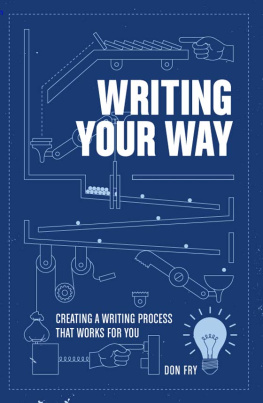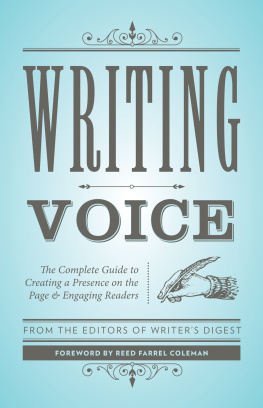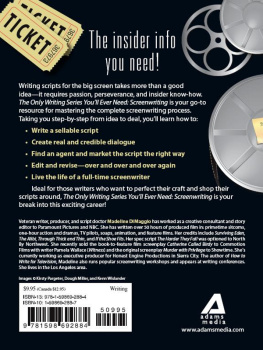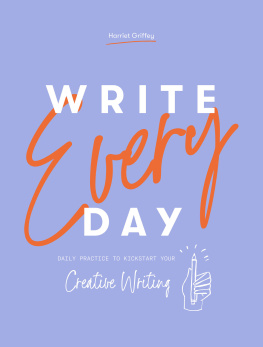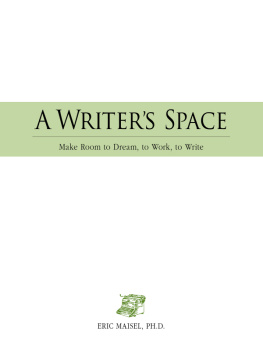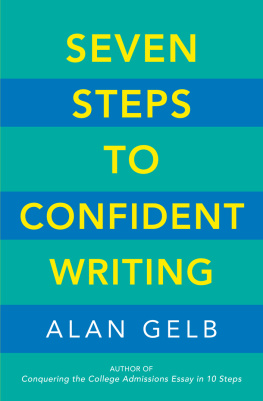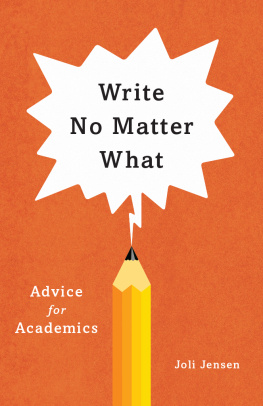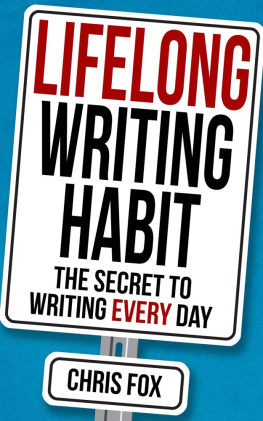DEDICATION
For Joan, the love of my life.

one
HOW THIS BOOK CAME ABOUT
I learned to write before I learned to read.
My father attended Navy radar school in Cambridge, Massachusetts. He enrolled me in the second grade in a local Catholic school, although we were Methodists. Navy children couldnt attend public schools in Massachusetts because their parents didnt pay taxes. Only the private Catholic school would accept me.
In my hometown of Raleigh, North Carolina, pupils learned to read and print in the second grade. But in the Cambridge school, children were taught to read and print a year earlier. So I entered my second year of school as the only illiterate in the class.
That year, the pupils learned to write script with a fountain pen. The nun, despite the fact that I fell in love with her, mocked me in front of the class as an example of what it meant to be Protestant, Southern, and illiterate.
One day, she wrote words in script on the blackboard, and we had to draw pictures of what the words represented. She put up the first word, which could have been in Sanskrit as far as I was concerned. So I cheated. I peeked at the picture drawn by the kid sitting next to me, evidently a crude B-17 bomber. I was a whiz at drawing warplanes, so I produced a magnificent Flying Fortress. Unfortunately the word on the board was potato.
I survived that semester and learned to read and print, although Ive never gotten the hang of longhand. The saving grace was that learning to read by phonics made me a perfect speller.
I wrote my first piece a year later back in Raleigh, when I was eight:
I wonder where the robin goes,
All the winter long.
Maybe where the tulip grows.
Theyd listen to his song.
My flame-haired third-grade teacher, Miss Kirkpatrick, read this piece of gibberish aloud to the class and launched my career as an author. Many people, perhaps including you, become writers because they never get over their first public praise.
In the eleventh grade, Phyllis Abbott Peacock took me under her wing. She was legendary for discovering talent, such as the novelist Reynolds Price, and tried to turn us all into another Thomas Wolfe, our local writer-hero. She required absolutely correct spelling, usage, and grammar to produce a perfect surface. She saw flawless prose as evidence of flawless character.
She demanded brevity. This tiny, birdlike woman would jump up and down in class, flapping her hands and chanting, Cut, cut. Cut, cut.
At Duke, I studied with another legend, William Blackburn, who disassembled poems and sentences before his amazed students, and showed how the words interacted. And I learned how to push the words apart to find the persona underneath.
I served as the communications officer on an Atlantic Fleet destroyer, where Mrs. Peacocks cut, cut mantra served me well. I had to encrypt every message I wrote, which put a premium on clear and short prose. I had to get to the point, because the point was the whole message, something like Twitter.
I never taught writing as a graduate student or as a professor of English. But one day, my wife, Joan, asked me to teach her how to write. I was shocked. Her parents, the novelist Dorothy Baker and the poet Howard Baker, wrote all the time, and Joan grew up resenting the fact that they ignored her while immersing themselves in books. At the age of eight, she kicked her father in the shin and yelled, Dont read!
She hated writing and writers, and she married me on the twin conditions that Id never ask her to type my stuff, or read anything I wrote.
A local weekly had recruited her to write food columns, and she accepted without realizing that she was in over her head. Writing aint cooking. She drafted her first column, which had three beginnings and three endings. Before I agreed to help her, she had to swear to take my advice as suggestions only, and that we would stay married.
We walked through her draft as I explained how to make sentences work, how to use paragraphs to develop thought, and how to structure the whole piece so readers would understand it. You dont have to tell Joan anything twice, and she quickly developed her own style. She wrote her column for two years and parlayed that experience into public-radio commentaries. And weve managed to stay married for forty-seven years.
One day, my favorite graduate student, Roy Peter Clark, came to my office with a paper hed written for another course. He called it the best thing hed ever written and demanded that I read it on the spot. I barely managed to get through the first page before I said, Roy, I cant understand a word of this. Its too dense and knotty, it doesnt make any sense.
Roy replied jubilantly, Yes! Ive done it. Form follows function, and Ive caught the density and opaqueness of my argument in the density and opaqueness of my prose!
I threw his paper out my office window, and we started a conversation that changed our lives and continues to this day. We talked about how readers read, how to achieve clarity for readers, and how to make the readers understanding the first goal of writing. We were both medievalists, and the reader became our Holy Grail.
I directed Roys dissertation (on farting in Chaucer, the definitive work on the subject). By a series of accidents, he (Roy, not Chaucer) ended up directing the writing program at the Poynter Institute in St. Petersburg, Florida. He invited me to sit in on his first writing seminar for newspaper reporters. He wanted me to do what I had taught him: question assumptions.
My research up until then focused on Beowulf. In Roys seminar, I made a stunning discovery. Instead of speculating on what an ancient, thoroughly dead poet thought as he composed, I could interview living professional writers about what was in their heads as they wrote. And I could help them write better.
I changed professions and became a writing coach.
I interviewed writers to understand their writing processes, and learned quickly how different their methods could be, and often how self-defeating. Each writer had his or her own combination of techniques that got a piece written, but most of them knew only one way to write, the way they were taught or the way they always did it. They used somebody elses writing process instead of one suited to them.
I discovered writers who had no way to know what they needed to know; they just collected information until they ran out of time. Many writers destroyed their confidence by critiquing every sentence as they typed it. Half the writers did nothing to figure out what they wanted to say; they just typed whatever fell out of their fingers and let their editors try to make sense of it.
So I began to help writers solve their problems by finding out what worked and what needed work, and designing ways to change their methods.
- A food writer paralyzed herself by worrying about whether her second cookbook would sell as well as her first; I shifted her attention to what she wanted to say, and away from what she feared.
- One writer, who wrote lengthy pieces, always took a month of weeping to write a perfect and fabulous first sentence, by which time she hated the whole project; I taught her to draft her opening and perfect it later.

